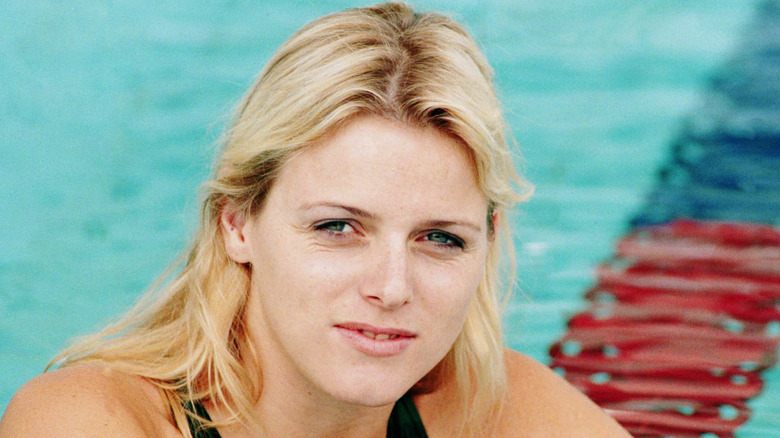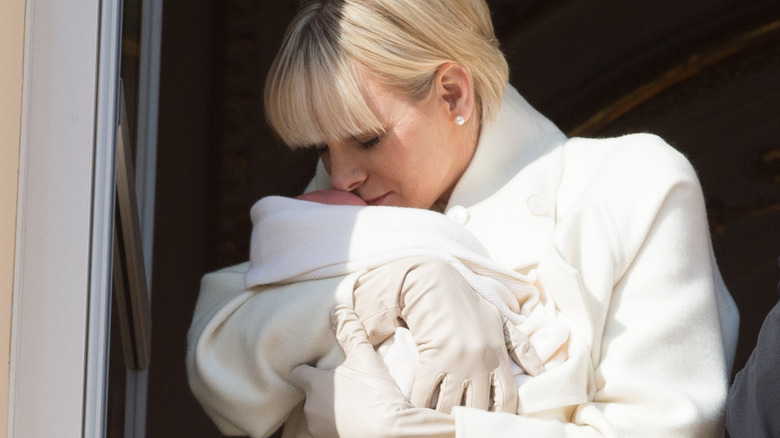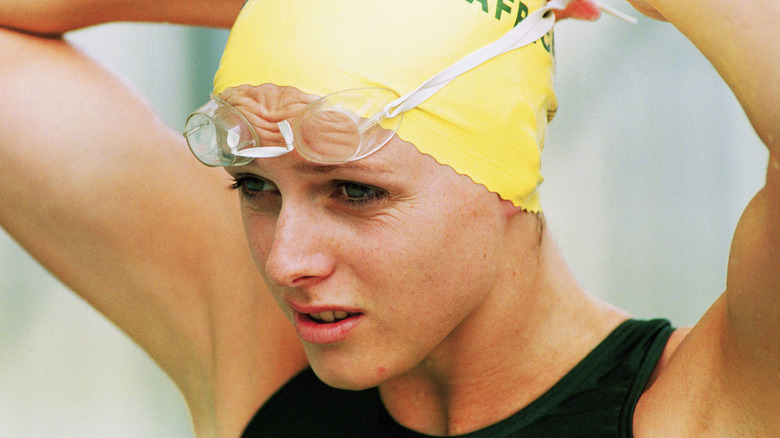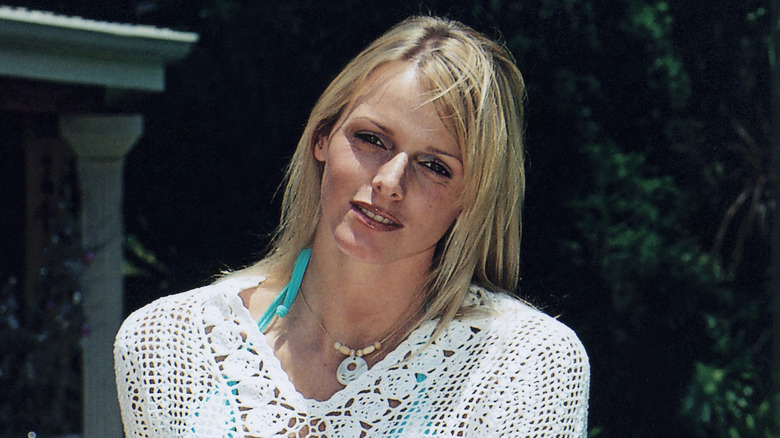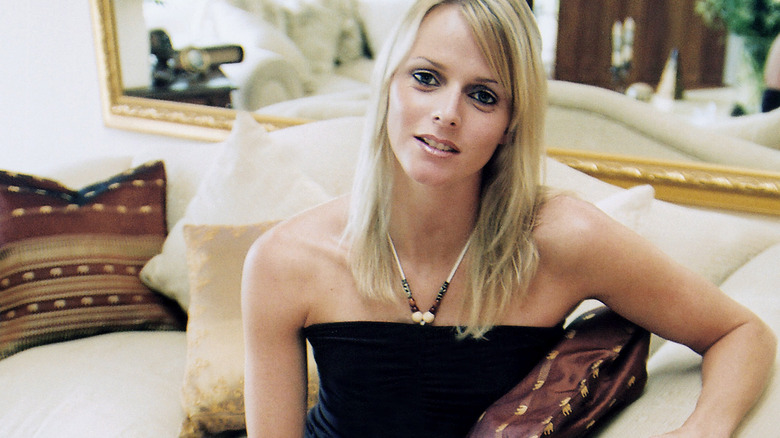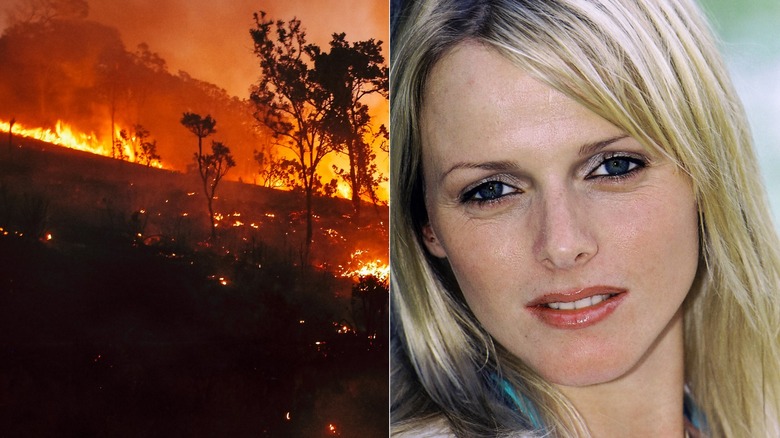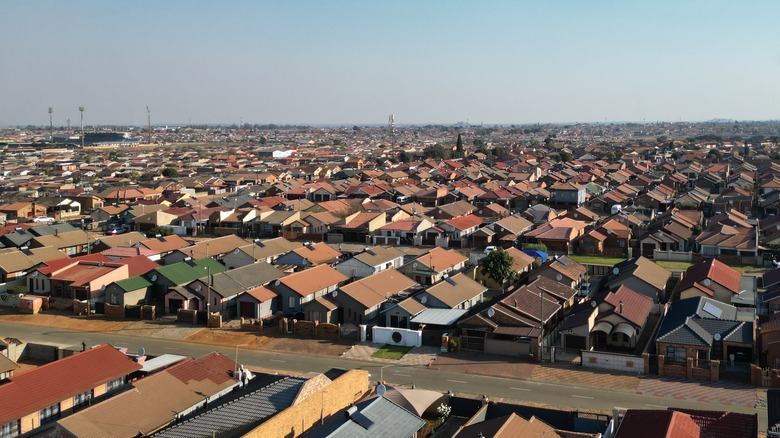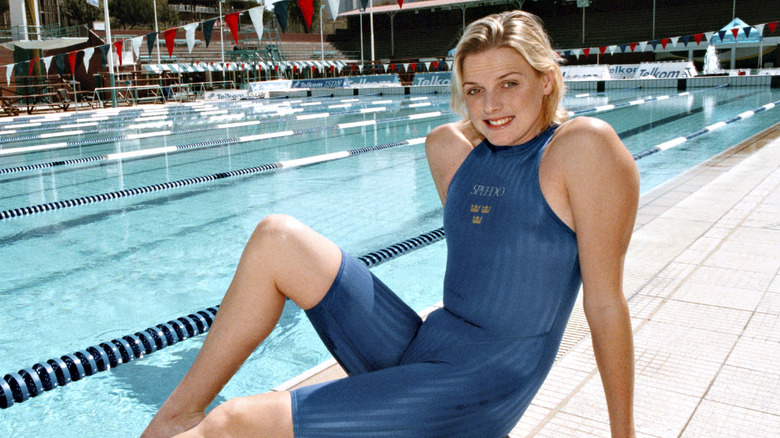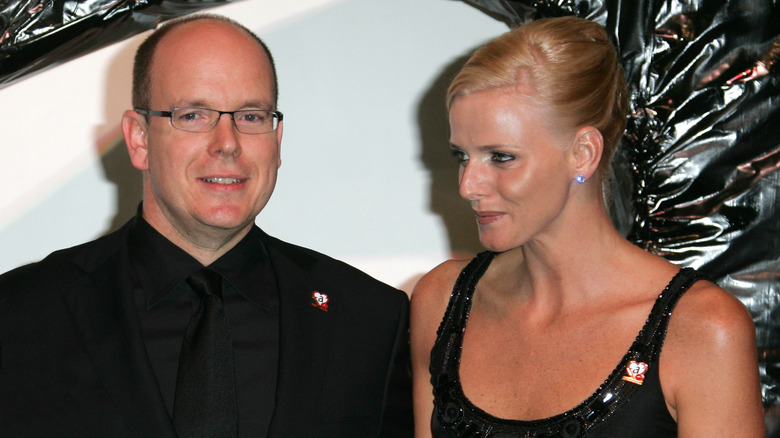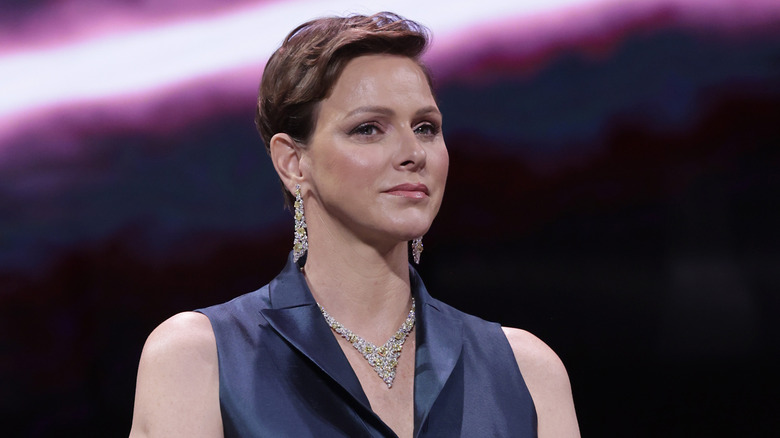Inside Princess Charlene's Tragic Childhood
You might assume that Princess Charlene had a privileged upbringing, like most European princesses. Princess Diana, for one, grew up frolicking on Queen Elizabeth II's Sandringham estate, as her father — an earl — had more than enough funds to lease the royal family's prestigious Park House. Princess Ingrid Alexandra of Norway, meanwhile, spent most of her childhood engaging in expensive sports, like surfing and downhill skiing. And, of course, the famous Monégasque royals, Princess Caroline and Princess Stéphanie, were practically raised to be jet-setters, routinely hopping from Paris to Switzerland to their home on Le Rocher.
In stark contrast to these women, however, Princess Charlene of Monaco did not grow up with a silver spoon in her mouth. If anything, her roots reveal a world of struggle. Born in now-Zimbabwe in 1978, Charlene came into the world during a tumultuous time. As the country's war of independence raged on, the future princess spent much of her childhood surrounded by unimaginable violence. Additionally, her parents came from a lower middle-class background, meaning that they did not necessarily have the funds to shield her from all that was going on.
As Charlene got older, her family faced one tragedy after the other — thanks to issues like a house fire, financial instability, and even murder. Through it all, the Zimbabwean beauty developed a strong sense of resilience. As one of the princess' close friends once told People, "She's a tough cookie."
Like her own children, Charlene was born prematurely
Princess Charlene's struggles began as soon as she was born. Her mother, Lynette Wittstock, gave birth to her about eight weeks early, causing a great deal of stress for the family. In an interview with the Daily Mail, the princess' great-aunt, Jacqueline, reflected on just how difficult this time was. "We saw [Charlene] in hospital in Mater Dei Hospital, just before we left [the country]. She was a little red thing in a big glass case with pipes everywhere. It's amazing that she has turned out so fit and strong."
Despite the challenge of coming into the world too soon, baby Charlene was able to fight for her life. As her father, Mike Wittstock, would later tell the French publication Paris Match, "The first time I saw her, she was in an incubator and the nurses said to me, 'Your little one is very tough.' It was 1978, when the country was still called Southern Rhodesia. She was born two months premature, and survived." In Wittstock's view, this early sense of tenacity has defined Charlene's personality throughout the years. "And that's how she has always been throughout her life: a very strong girl with an iron will," he said.
Interestingly, this experience would have a profound impact on the princess. When Charlene welcomed her own children, twins Prince Jacques and Princess Gabriella, prematurely, she found strength in her own story, telling Paris Match, "I was much smaller and frailer than them."
Charlene's life 'nearly ended in tragedy' when she fell into a pool
These days, Princess Charlene is known as something of a swimming sensation. Back in 2000, she represented South Africa at the Olympics Games in Sydney, Australia, where her 4 x 100 meters relay team came in fifth place. Long before that, though, Charlene had a much more complicated relationship with the water — one that could've led to her death.
According to the biography, "Charlene: In Search of a Princess," by royal expert Arlene Prinsloo, the future princess almost drowned while she was just a toddler. As Prinsloo explained, "The carefree days [of Charlene's childhood] nearly ended in tragedy when the Wittstocks' dog knocked three-year-old Charlene into the pool." Luckily, the tiny athlete had already learned some water safety basics. After all, her mother, Lynette Wittstock, had experience working as a swimming instructor. Per Prinsloo's report, "Thankfully, Lynette had taught Charlene how to swim even before she could walk, and Charlene managed to get to the edge of the pool."
Sadly, though, not everybody in the Olympian's family was so fortunate. As Charlene's great-aunt Jacqueline would later tell the Daily Mail, one of the princess' little cousins drowned in a swimming pool in 1982. He was just 3 years old at the time. Additionally, in an interview with Top Billing, Charlene revealed, "A few friends of mine had lost their children and grandchildren, relatives, to drowning." These tragic experiences motivated the princess to start water safety programs through The Princess Charlene of Monaco Foundation.
Charlene was born during the Zimbabwean War of Liberation
When Princess Charlene was growing up, her home country was in the midst of the Zimbabwean War of Liberation, also called the Rhodesian Bush War. "At the time of Charlene's birth, Rhodesia was still in the grips of the bloody and fierce Bush War, and would only become independent in April 1980," royal expert and journalist Arlene Prinsloo explained in her book, "Charlene: In Search of a Princess." "The violence didn't end with independence, and Charlene remembers her childhood as carefree but also filled with fear."
One of the most difficult things about being raised during a war certainly was the absence of Charlene's father, Mike Wittstock. As a healthy young man, Mike was expected to take up arms and fight in the conflict, meaning that he was frequently away from his family. Reflecting on this difficult time, Mike would later tell Paris Match that Charlene's childhood "was pretty rough." He went on to recall, "At the time, the country was at war [for Zimbabwean independence]. So, I wasn't always there. I was going to the front for six weeks."
She was 'filled with fear' during parts of her childhood
As the war raged on in Zimbabwe, Princess Charlene's parents, Mike and Lynette Wittstock, did everything in their power to shield their daughter from the cruelty of the outside world. In an interview with Paris Match, Mike once posited that Charlene was protected from the brunt of the conflict, stating, "Charlene never really knew what was going on."
Sadly, though, this assertion was not entirely true. As the future princess was growing up, she experienced a tremendous amount of fear. On one occasion, Charlene's mother spotted soldiers in the family's backyard. In the heat of the moment, Lynette concocted a plan to keep her daughter safe. As Arlene Prinsloo recounted in her book, "Charlene: In Search of a Princess," Charlene once told the Afrikaans language outlet, Rapport, "It must have been frightening for my mother, she hid me in the cupboard while rebels were running through our garden."
Although Charlene survived this terrifying encounter, not all of her playmates were so lucky. In the same interview, the princess revealed that two of her friends died in the conflict. She recalled, "So I remember [my childhood days] filled with fear, but also carelessness. It was a bit difficult to go to school and suddenly two of our friends are gone because they have been murdered on their farm."
Charlene's family home burned down
Although the Wittstocks survived the war, that did not prevent the family from enduring a different type of tragedy. During the late 1980s, the family's home burned down, and the family got away with little more than their lives. With few possessions and nowhere else to go, they set up camp in a cheap hotel, where they resided for a year. During this time, the Wittstocks' future was uncertain. "The family had lost nearly everything and had to start from scratch," Arlene Prinsloo detailed in "Charlene: In Search of a Princess."
Eventually, Mike and Lynette Wittstock realized that they could not remain in Zimbabwe forever. Desperate for a fresh start, they told their three children that they would be moving to South Africa in search of something better. Charlene would later reflect on this time in an interview with Rapport, remembering, "My dad said to us: Make peace, we are not going back. All my friends, the Sunday afternoons playing cricket on the farms ... the life I had known was over." The Wittstocks packed their few belongings and headed to Benoni, a town located outside of Johannesburg.
Her parents were not able to move into a safe neighborhood
The Wittstock's new home in Benoni, South Africa, was considerably less dangerous than their former residence in war-torn Zimbabwe. Even so, it was far from being safe. Because of the family's lower middle-class background, they had no way to afford a dwelling in one of Johannesburg's safer areas. As a result, violence continued to be a part of the Wittstocks' daily life.
Speaking about this issue in an interview with The Sunday Times in 2013, Princess Charlene revealed the level of danger in the neighborhood. "I worry about them a lot. I worry about the fact that people break into the house and they've been robbed many times. There have been a lot of killings on our street." She went on to explain how her parents' financial situation prevented them from finding somewhere safer to live.
"If you're not from a very wealthy background — and we are from a very lower middle-class income — you can't afford to live in a secure area." Despite these challenges, however, Charlene said that her parents managed to come to terms with their circumstances, sharing, "But they wouldn't have it any other way; they are happy."
She 'never did the normal things with the other children'
Another factor that shaped Princess Charlene's childhood was her passion for swimming. Once her family was all settled in South Africa, the young athlete began dedicating more and more time to the sport, spending hours and hours training at the pool. Her coaches remember her as an extremely hard-working swimmer. As her former manager, Dean Price, told Arlene Prinsloo for her book, "Charlene: In Search of a Princess," "Charlene was really good. She was very dedicated and a very serious swimmer. She worked really hard and was a nice and fun person to have around."
Nevertheless, Charlene's commitment to athletics came at a cost. Whereas other teenagers were out being social and having fun, Charlene was almost always in the water. One of her former teachers anonymously told the South African outlet, Times Live, "She never did the normal things with the other children like going to the movies. She was always in training, at the swimming pool or going to a competition." This meant that Charlene did not ever get to enjoy the benefits of a more normal childhood — and all the learning that goes along with it.
The insider explained that Charlene's father "pushed his children to be the best and to excel. He could be quite a difficult man but he pushed them and demanded discipline."
Charlene often ended up 'heartbroken' as a teen
One of the biggest things that Princess Charlene missed out on as a result of her swimming was traditional dating. Because her training schedule was so intense, Charlene did not have a lot of time for boys. As Mike Wittstock once told Paris Match, "To be, at 15 years old, up at 4:30 a.m. every morning and doing dozens of laps, you have to be very focused and motivated. Charlene always knew what she wanted and she gave it the means."
Unfortunately, though, this prevented the future princess from getting very much dating experience. According to Arlene Prinsloo's "Charlene: In Search of a Princess," the former athlete opened up about this issue in a 2001 chat with South Africa's Sports Illustrated. During this conversation, Charlene reportedly explained how hard it was to get excited about dating when the thought of an Olympic medal was so much more enticing, "Sometimes, you would like to be normal, but the desire to win often stops you from getting involved with other people." She went on to lament that most of the boys her age failed to understand the unique nature of her career.
"It's very hard to have relationships because they don't understand that you have to travel. I've had boyfriends that would have other girlfriends by the time I get back from my trips ... I get heartbroken."
She had difficulty making friends in Monaco
Over the years, Princess Charlene has gone through a lot. She has lived through a war, lost dear friends and playmates, and even moved to a new country to start over. Although it is impossible to say how these childhood traumas have impacted Charlene, one does have to wonder what it's like for her to now live in the gilded principality of Monaco. After all, unlike many of the folks who reside in what some people refer to as "the billionaire's playground," Charlene knows what the world is like outside that glittering bubble.
Compellingly, Charlene has hinted about this issue a number of times — pointing out that she does not have a whole lot in common with the Monégasque elite. As she once told The Sunday Times, "The people I mix with in Monaco don't relate to my South African mentality or humor." Unfortunately, these differences have limited her social life, leaving her in a situation where she feels isolated. Charlene went on to share, "I have made two close friends in Monaco."
But, what the princess lacks in social integration, she makes up for in the level of empathy that she brings to her charity work. Through the Princess Charlene of Monaco Foundation, she travels around the world, jumping in pools with kids and teaching them to swim.
